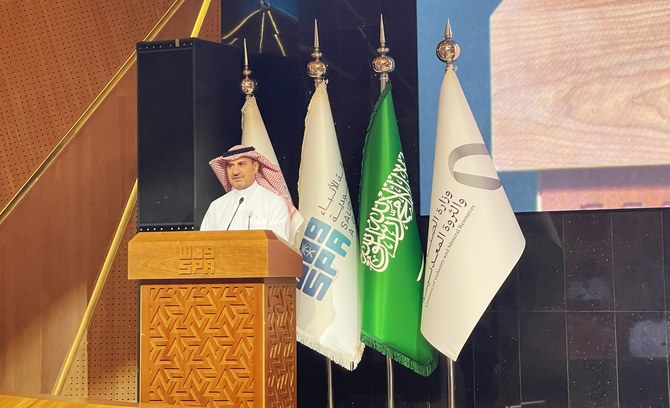Saudi Arabia has the competitive advantage of becoming a global leader in green minerals, according to the vice minister for mining affairs at the Ministry of Industry and Mineral Resources.
Addressing a news conference for the third edition of the Future Minerals Forum scheduled from Jan. 9-11 in Riyadh, Khalid Al-Mudaifer emphasized that the Kingdom holds a unique competitive edge as a central hub for mineral processing encompassing green minerals, steels, aluminum, copper and magnesium.
“Saudi Arabia is a place to convene the world. Our demand for minerals and our transformation in minerals make us the place for the convening,” Al-Mudaifer told Arab News in an interview.
He also underlined that the Kingdom boasts substantial natural resources estimated to be around $1.3 trillion.
A significant share of these resources includes phosphate, constituting 25 percent of the estimated wealth.
“Saudi Arabia is the third largest producer of phosphate fertilizer … this is considered almost 7 percent of the world,” Al-Mudaifer asserted.
Reaffirming the Kingdom’s competitive advantages, Al-Mudaifer also underscored that the process of making phosphate involves specific infrastructure needs, including gas for ammonia and nitrogen production and sulfur, which Aramco produces through its oil and gas operations.
These competitive advantages have enabled the Kingdom to build its phosphate industry on the back of investments of over SR60 billion ($16.2 billion).
“We have announced, or there is work to enable phosphate four and three, for which another SR40 billion will be invested in the future,” Al-Mudaifer added.
The goal is to position the Kingdom as the second or third-largest supplier of phosphate fertilizers globally.
Additionally, he noted that the private sector has played a significant role, investing more than SR120 billion in these initiatives.
At the same time, the government has also contributed over SR50 billion to enhance and support the growth of the phosphate industry.
This approach illustrates a collaborative effort between the private and public sectors to boost Saudi Arabia’s capabilities and competitiveness in the global phosphate fertilizer market.
During the news conference, Al-Mudaifer revealed that 95 countries and over 20 organizations worldwide will participate in the FMF.
“For the first time, we will have the Saudi Geological Survey participate in this conference,” he said, adding that there would be over 75 sessions from Jan. 10-11.
In October, during the Middle East and North Africa Climate Week 2023, Al-Mudaifer highlighted Saudi Arabia’s strategy for becoming a powerhouse in the sector, according to the Saudi Press Agency.
He emphasized that by leveraging the Kingdom’s strategic location, advanced infrastructure and strong local demand, the government is charting a path toward securing the minerals necessary for its national industrial transformation.
“Saudi Arabia is committed to the transition to green energy, as demonstrated by the development of a mining and mineral industries strategy designed to address critical challenges,” he had said then.
The Kingdom has pledged to achieve net-zero emissions by 2060. It has undertaken $1 billion of climate change initiatives to hit this target, including working toward a regional carbon capture and storage center, an early storm warning hub and cloud seeding programs.
source/content: arabnews.com (headline edited)
____________

Khalid Al-Mudaifer emphasized that the Kingdom holds a unique competitive edge as a central hub for mineral processing encompassing green minerals, steels, aluminum, copper and magnesium. AN
_________________
SAUDI ARABIA